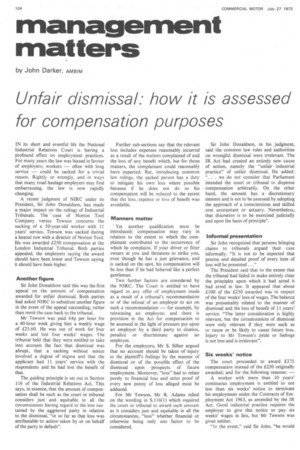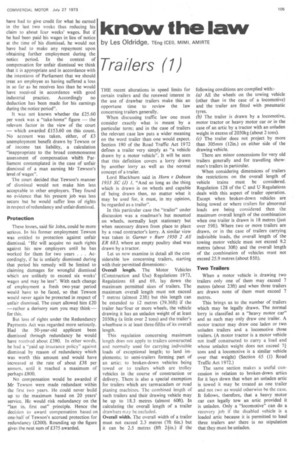management matters
Page 106

Page 107

If you've noticed an error in this article please click here to report it so we can fix it.
by John Darker, AMBIM
Unfair dismissal: how it is assessed for compensation purposes
IN its short and eventful life the National Industrial Relations Court is having a profound effect on employment practices. For many years the law was biased in favour of employers; workers — often with long service — could be sacked for a trivial reason. Rightly or wrongly, and in ways that many road haulage employers may find embarrassing, the law is now rapidly changing.
A recent judgment of NIRC under its President, Sir John Donaldson, has made a major impact on the rulings of Industrial Tribunals. The " case of Norton Tool Company versus Tewson concerns the sacking of a 50-year-old worker with 11 years' service. Tewson was sacked during a heated row with a director of Norton Tool. He was awarded £250 compensation at the London Industrial Tribunal. Both parties appealed, the employers saying the award should have been lower and Tewson saying it should have been higher.
Another figure Sir John Donaldson said this was the first appeal on the amount of compensation awarded for unfair dismissal. Both parties had asked NIRC to substitute another figure in the event of the appeal succeeding, rather than remit the case back to the tribunal.
Mr Tewson was paid 64p per hour for a 40-hour week giving him a weekly wage of £25.60. He was out of work for four weeks and lost four weeks' wages. The tribunal held that they were entitled to take into account the fact that dismissal was abrupt, that a sacking without notice involved a degree of stigma and that the applicant had 11 years' service with the respondents and he had lost the benefit of that.
The guiding principle is set out in Section 116 of the Industrial Relations Act. This says, in essence, that the amount of compensation shall be such as the court or tribunal considers just and equitable in all the Circumstances having regard to the loss sustained by the aggrieved party in relation to the dismissal, in so far as that loss was attributable to action taken by or on behalf of the party in default". Further sub-sections say that the relevant loss includes expenses reasonably incurred as a result of the matters complained of and the loss of any benefit which, but for those matters, the complainant could reasonably have expected. But, introducing common law rulings, the sacked person has a duty to mitigate his own loss where possible because if he does not do so his compensation will be reduced to the extent that the loss, expense or loss of benefit was avoidable.
Manners matter Yet another qualification must be introduced: compensation may vary in relation to the extent to which the complainant contributed to the occurrence of which he complains. If your driver or fitter swears at you and threatens to strike you, even though he has a just grievance, and is sacked on the spot, his compensation will be less than if he had behaved like a perfect gentleman.
Two further factors are considered by the NIRC. The Court is entitled to have regard to any offer of employment made as a result of a tribunal's recommendation or of the refusal of an employer to act on such a recommendation — for example, by reinstating an employee; and there is provision in the Act for compensation to be assessed in the light of pressure put upon an employer .by a third party to dismiss, penalize or discriminate against an employee.
For the employers, Mr S. Silber argued that no account should be taken of injury to the plaintiff's feelings by the manner of dismissal or of the possible effect of the dismissal upon prospects of future employment. Moreover, "loss" had to relate purely to financial loss and strict proof Of every new penny of loss alleged must be adduced.
For Mr Tewson, Mr R. Adams relied on the wording in 5.116(1) which required the court or tribunal to award such amount as it considers just and equitable in all the circumstances, "loss" whether financial or otherwise being only one factor to be considered. Sir John Donaldson, in his judgment, said the common law rules and authorities on wrongful dismissal were irrelevant. The IR Act had created an entirely new cause of action, namely the "unfair industrial practice" of unfair dismissal. He added: ". . . we do not consider that Parliament intended the court or tribunal to dispense compensation arbitrarily. On the other hand, the amount has a discretionary element and is not to be assessed by adopting the approach of a conscientious and skilled cost accountant or actuary. Nevertheless, that discretion is to be exercised judicially and upon the basis of principle".
I nformal presentation
Sir John recognized that persons bringing claims to tribunals argued their case informally. "It is not to be expected that precise and detailed proof of every item of loss will be presented ..."
The President said that to the extent that the tribunal had failed to make entirely clear the principles upon which it had acted it had erred in law. It appeared that about £100 of the £250 awarded was in respect of the four weeks' loss of wages. The balance was presumably related to the manner of dismissal and the loss of benefit of 11 years' service. "The latter consideration is highly relevant, but the circumstances of dismissal were only relevant if they were such as to cause or be likely to cause future loss. Injury to Mr Tewson's pride or feelings is not loss and is irrelevant".
Six weeks' notice The court proceeded to award £375 compensation instead of the £250 originally awarded; and for the following reasons: — A worker with more than 10 years' continuous employment is entitled to not less than six weeks' notice to terminate his employment under the Contracts of Employment Act 1963, as amended by the IR Act. Good industrial practice requires the employer to give this notice or pay six weeks' wages in lieu, but Mr Tewson was given neither.
"In the event," said Sir John, "he would have had to give credit for what he earned in the last two weeks thus reducing his claim to about four weeks' wages. But if he had been paid his wages in lieu of notice at the time of his dismissal, he would not have had to make any repayment upon obtaining further employment during the notice period. In the context of compensation for unfair dismissal we think that it is appropriate and in accordance with the intentions of Parliament that we should treat an employee as having suffered a loss in so far as he receives less than he would have received in accordance with good industrial practice. Accordingly no deduction has been made for his earnings during the notice period".
It was not known whether the £25.60 per week was a "take-home" figure — the relevant factor in the view of the court — which awarded £153.60 on this count. No account was taken, either, of £3 unemployment benefit drawn by Tewson or of income tax liability, a calculation "inappropriate to the broad commonsense assessment of compensation whith Parliament contemplated in the case of unfair dismissal of a man earning Mr Tewson's level of wages".
The court decided that Tewson's manner of dismissal would not make him less acceptable to other employers. They found no evidence that his present job was less secure but he would suffer loss of rights in respect of redundancy and unfair dismissal.
Protection These losses, said Sir John, could be more serious. In his former employment Tewson was entitled to protection against unfair dismissal. "He will acquire no such rights against his new employers until he has worked for them for two years . . . Accordingly, if he is unfairly dismissed during that period his remedy will be limited to claiming damages for wrongful dismissal which are unlikely to exceed six weeks' wages and may be less". With each change of employment a fresh two-year period would have to be faced, so that Tewson would never again be protected in respect of unfair dismissal. The court allowed him £20 —rather a derisory sum you may think— for this.
But loss of rights under the Redundancy Payments Act was regarded more seriously. Had the 50-year-old applicant been dismissed through redundancy he would have received about £380. In other words, he had a "paid up insurance policy" against dismissal by reason of redundancy which was worth this amount and would have increased at the rate of about £38 per annum, until it reached a maximum of perhaps £800.
No compensation would be awarded if Mr Tewson were made redundant within the first two years. He could never build up to the maximum based on 20 years' service. He would risk redundancy on the "last in, first out" principle. Hence the decision to award compensation based on one-half of Tewson's accrued protection for redundancy (£200). Rounding up the figure gives the neat sum of £375 awarded.
























































































































































